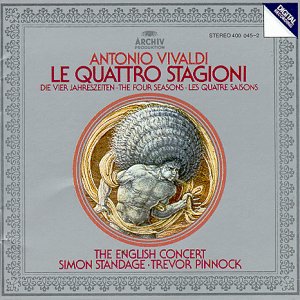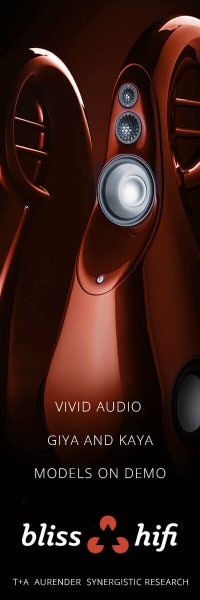ANTONIO VIVALDI,
| ANTONIO VIVALDI, “LE QUATTRO STAGIONI, THE FOUR SEASONS,” THE ENGLISH CONCERT WITH SIMON STAGE AND TREVOR PINNOCK [ARCHIV PRODUKTION, POLYDOR INTERNATIONAL, CD-400045-2 1982]
|
|
CREATING FLESH FROM BONE:
|
| Nelson Brill |
| October 30, 2003 |
 Here in New England, the change of seasons is in full view as I take a moment to cue up another audiophile recording and reminisce over what might have been with the rest of Red Sox nation here. The change of seasons (and the official end to baseball for this year) brings immediately to mind the classic autumnal“Dance of the Country Folk“ followed by the solace of the “Sleeping Drunkard“ of Vivaldi‘s “the Four Seasons.” Not another review of a Four Seasons disc you probably are thinking. Well, wait just one palpable minute, please. “Palpable“ you say? Yes. Palpability is exactly what this superb recording is all about.“Palpability“ is defined as “capable of being handled, touched or felt.“ (American Heritage Dictionary, 4th Ed.)
Here in New England, the change of seasons is in full view as I take a moment to cue up another audiophile recording and reminisce over what might have been with the rest of Red Sox nation here. The change of seasons (and the official end to baseball for this year) brings immediately to mind the classic autumnal“Dance of the Country Folk“ followed by the solace of the “Sleeping Drunkard“ of Vivaldi‘s “the Four Seasons.” Not another review of a Four Seasons disc you probably are thinking. Well, wait just one palpable minute, please. “Palpable“ you say? Yes. Palpability is exactly what this superb recording is all about.“Palpability“ is defined as “capable of being handled, touched or felt.“ (American Heritage Dictionary, 4th Ed.)
In this 1982 recording by the English Concert, on original period instruments and led by the expressive Trevor Pinnock on harpsichord, Vivaldi‘s vision is brilliantly achieved in a recording which should test every ounce of your system‘s ability to communicate palpability and the edges of the performance space. The dynamics and presentation of this recording is laid out before you in accurate and precise detail, without any loss of emotional impact. Lead violinist and soloist Simon Standage performs with a deftness and fluidness that I have not heard on any other recording of this piece, and the melding of rosin, bow and string is a marvel to behold. In several places, you should be able to discern and enjoy the unusual tone of the Tiorba, an Italian string instrument from the XVI and XVII centuries, a member of the lute family. In Vivaldi‘s Winter scene, the Tiorba introduces itself as a delicate, harp like reflection to the strong staccato notes of Standage‘s violin as the whole scene builds to a swell of familiar tension, which in Vivaldi‘s own notes, depicts “running and foot stomping because of the cold.“ The Tiorba appears again in the depiction of “Rain“ in the Winter Largo scene, as delicate plucks of the period string instruments are accurately defined in a wide and airy soundstage, opposite the beautiful flowing theme played by Standage. It is also worthy to note that this recording gem represents a unique performance of an earlier and more accurate manuscript of “the Four Seasons,“ taken from the “Manchester Manuscript“, which originated 14 years earlier than the manuscript from which most modern performances of this piece originate. I was fortunate enough to visit Venice this summer, the milieu in which Vivaldi lived and worked. If you go, you too can have the opportunity to hear Vivaldi performed in the original church and hall spaces in which this music was first performed. When I listen to this recording now, it brings me back to those same acoustic spaces, with a palpable sense of the music‘s intimacy and dynamics. Find this gem and let your system test its ability to create flesh from bone.
I would love to hear from readers on their own favorite recording gems in any genre to be shared in possible future reviews at Stereo Times . Please send any comments or suggestions to: NelsonBrill@stereotimes.com
![]()
Don’t forget to bookmark us! (CTRL-SHFT-D)
Stereo Times Masthead
Publisher/Founder
Clement Perry
Editor
Dave Thomas
Senior Editors
Frank Alles, Mike Girardi, Russell Lichter, Terry London, Moreno Mitchell, Paul Szabady, Bill Wells, Mike Wright, and Stephen Yan,
Current Contributors
David Abramson, Tim Barrall, Dave Allison, Ron Cook, Lewis Dardick, John Hoffman, Dan Secula, Don Shaulis, Greg Simmons, Eric Teh, Greg Voth, Richard Willie, Ed Van Winkle, Rob Dockery, Richard Doran, and Daveed Turek
Site Management Clement Perry
Ad Designer: Martin Perry





Be the first to comment on: ANTONIO VIVALDI,